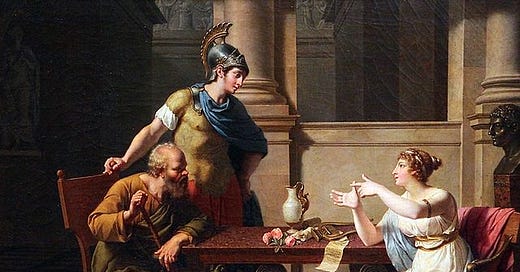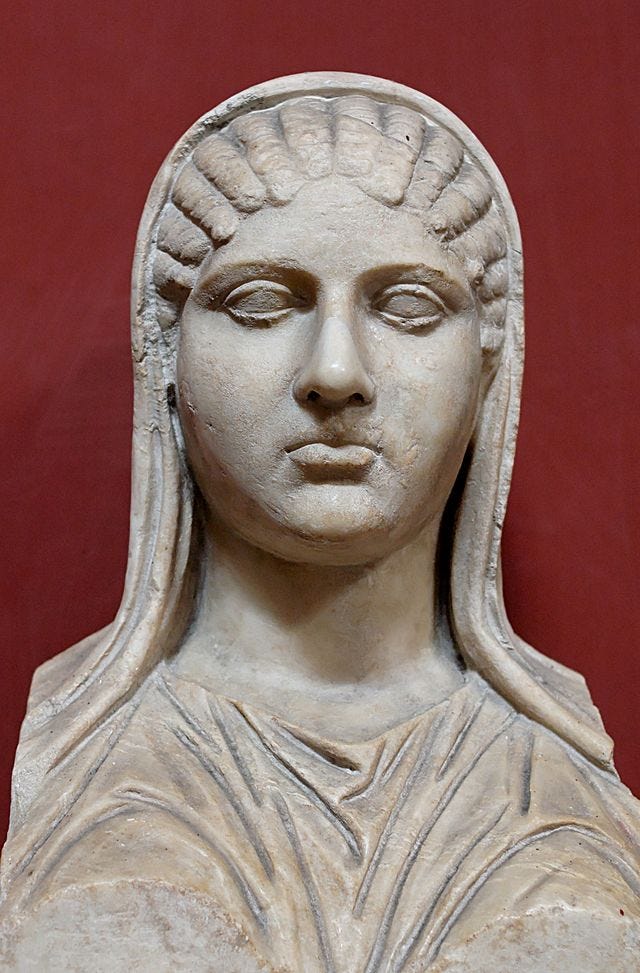"Force for Truth": Aspasia in Ancient Greece
Her students included one of Athens’ greatest generals, and the famous philosopher, Socrates
In Plato’s Apology, readers find Socrates on trial, defending himself against accusations of impiety and corrupting the youth. His defense speech is one of the most famous passages in philosophy. In the Athens courtroom, we experience Socrates not only as a brilliant philosopher but as a brilliant public speaker. His skills of rhetoric, also known as the art of persuasion, are on full display. Here’s an excerpt from the opening paragraph:
“...they told you to be upon your guard, and not to let yourselves be deceived by the force of my eloquence. They ought to have been ashamed of saying this, because they were sure to be detected as soon as I opened my lips and displayed my deficiency; they certainly did appear to be most shameless in saying this, unless by the force of eloquence they mean the force of truth; for then I do indeed admit that I am eloquent.”
There is so much to unpack in these few sentences. We get a glimpse into one of Socrates’ genius trademark tactics, appearing less than capable while being the most capable so as to not intimate debaters. I think Socrates loved the element of surprise. It never failed to shock his opponents when they lost to him, no matter how many times it happened.
Although, the Apology marks one of the only documented times Socrates’ wit and wisdom couldn’t outsmart tyrannical law. Ultimately, he was sentenced to death by way of poison.
Books upon books have been written about Socrates’ unrivaled philosophical prowess. We know Plato, perhaps the king among Western philosophers, was Socrates’ student. We know Aristotle, another worthy titan, was Plato’s successor.
But I’ve often wondered, who taught Socrates?
As it turns out, Plato offers us insight into that question in another one of his works, Menexenus. That’s where we are briefly introduced to a mysterious female figure who taught Socrates the ways of persuasion. A mysterious female figure still puzzling researchers today.
The Arena of Ideas
In the Apology, Socrates is quoted as saying, “let the judge decide justly and the speaker speak truly.”
Where does one come up with such iconic, off-the-cuff lines?
In order to be a good philosopher, one doesn’t only hone his thinking internally. He has to be able to communicate effectively, winning over doubters in the arena of ideas instead of strongarming them. But how does one become an effective communicator or speaker? In Ancient Greece, people would sometimes learn from professional rhetoricians.
In Menexenus, Socrates proclaims, “I happen to have no mean teacher of oratory."
The teacher he was referring to?
Aspasia, a woman from Miletus, the same town that gave us the world’s first recognized philosopher, Thales.
Eventually, Aspasia sought refuge in Athens. That’s where she met Pericles. He would eventually become one of Ancient Greece’s most important statesmen. And he would do so with Aspasia’s help. Because before Aspasia taught Socrates the art of rhetoric, she taught Pericles the same.
When Aspasia met Pericles, because she was not an Athenian citizen, they couldn’t legally get married. They maintained a close relationship for years though. Eventually, Pericles became one of Athens’ formidable politicians and a top military general. He championed democracy and was essential to the Athenian government during its most prosperous time known as the “Golden Age of Athens.” He also helped erect some of the civilization’s most historic buildings, like the Parthenon.
Aspasia’s knowledge of rhetoric influenced Pericles as he made his way up Athens’ complicated political ladder.
From Mighty General to Mighty Philosopher
At one point, Aspasia found herself teaching another promising pupil, the great Socrates, Ancient Greece’s most famous philosopher.
Though not much is known about their relationship, Plato’s record of Socrates’ admission in the Menexenus offers a surprising plot twist.
Because Aspasia and Pericles could never legally marry, some scholars have posited in the past that she was a hetaira, the ancient equivalent of today’s top-dollar escort. But the lack of evidence regarding this theory leaves me with great skepticism.
The burning of the Library of Alexandria meant the loss of a significant amount of Ancient Greece’s important philosophical works. It can be hard to find complete works by philosophers like Aristotle (it is estimated only a quarter of his writings survive). Concrete evidence about a philosopher’s life, like Socrates, is also hard to come by. Information regarding the women of Ancient Greece is even more obscure due to the culture’s social constructs.
While Ancient Greece is responsible for turning the lights on in the West, one of its dark spots remains its treatment of women, who were seen as purely domestic creatures. So a woman like Aspasia would have been met with much resistance, including efforts to bury her existence.
Couple that with Ancient Greece’s polarized view of rhetoric, and Aspasia’s fading into the ether of history becomes two-fold.
In his article, “Aspasia: The Philosopher Who Taught Socrates Rhetoric,” William Buckingham offers context on the public perception of rhetoric at the time:
“In Ancient Greece, the idea of rhetoric was always under suspicion. And a female rhetorician was perhaps doubly suspect. The argument against rhetoric was that if we are skilled enough, we can persuade people of anything — whether it is true or not — and so rhetoric is at best an ambivalent tool, and at worst a genuine threat to reasoned debate. But the counter-argument — one that is made by Aristotle as well — is that rhetoric is an important skill, one that supplements our search for truth. If you know something to be true, but are incapable of persuading others, then it is hard for this knowledge to be put to use. In this second view, rhetoric is essential to public reason and debate. Truth is useless if we cannot persuade anybody of the truth.”
Regarding the impact she made on Socrates, Buckingham said, “And if Aspasia was indeed Socrates’ teacher in rhetoric, it is clear that she was successful: Plato’s dialogues provide ample evidence of Socrates’s enormously persuasive style of debate and argumentation.”
Digging for Truth
Socrates reported being taught by a woman another time in Plato’s writing. In The Symposium, Socrates says he was educated in the ways of love by priestess Diotima of Mantinea.
Stories like Aspasia’s offer glimpses into the Ancient Greek world that create a more integrated, whole picture. The soil we dig through in order to tell their stories is deep, but it leaves us with no shallow answers.






Years ago I read Taylor Caldwell's Glory and the Lightning, biofiction which first sparked my interest in Aspasia. Caldwell did a throrough job researching her and the era. People are still reading the novel today even though it was first published in 1974, a testament to Aspasia's enduring appeal and Caldwell's masterful writing.
It seems worth mentioning the very structures of ancient Greece rested on Ionic and Corinthian pillars, both orders based on the proportions of the female human body.